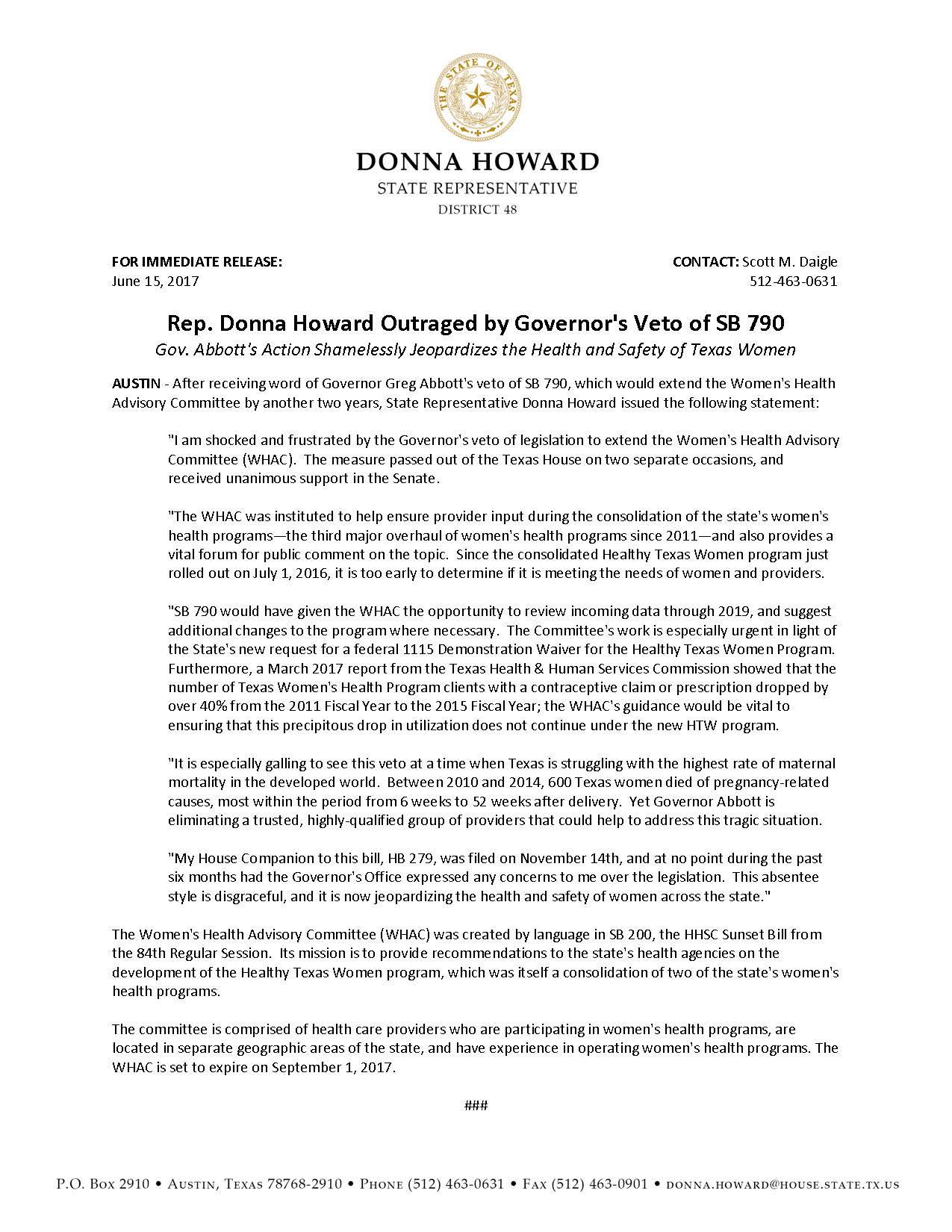Last Monday marked the final meeting of the Women's Health Advisory Committee (WHAC), which is set to expire on September 1st of this year. The WHAC was created by an amendment from Rep. Howard in 2015, and its mission is to provide recommendations on the consolidation of the state's women's health programs. The committee is comprised of health care providers from separate geographic areas of the state who have experience in operating women's health programs. In the recent Regular Session of the Texas Legislature, the Representative successfully passed SB 790 to extend the group for another two years; disappointingly, that bill was vetoed by the Governor.
The agenda of the August 14th meeting featured two major items: a presentation on maternal mortality in Texas by Dr. Lisa Hollier, the Chair of the state's Maternal Mortality and Morbidity Task Force, and an update on the state's women's health programs. Here are a few key points from that discussion:
Maternal Mortality
- The Maternal Mortality Rate (MMR) is identified as the number of maternal deaths occurring within 42 days of the end of pregnancy per 100,000 births (it has been reported that the MMR in Texas is the highest in the developed world)
- Dr. Hollier states that the current process of identifying maternal deaths is imprecise, and the Task Force is working with the Texas Department of State Health Services (DSHS) to develop a more accurate rate
- The rise in the state's MMR is likely due to increases in chronic diseases known to complicate pregnancy, such as obesity, hypertension, and Type II Diabetes
- The MMR is highest among African-American women; in Texas, they account for 11.4% of births but 28.8% of maternal deaths
- In the 85th Regular Session of the Texas Legislature, lawmakers added to new charges for the Task Force and DSHS: examine the role of postpartum depression and evaluate client service programs that are designed to address it, and develop best-practice guidelines and protocols for reporting and investigating pregnancy-related deaths
- (as we noted here, the Legislature also took action in the recent Special Session to extend the Task Force through 2021, though lawmakers have been criticized for not taking bolder action)
- In addition to the new legislative charges, the Task Force is promoting the implementation of maternal safety bundles, particularly to address obstetric hemorrhage and severe hypertension/preeclampsia; 20 states have already implemented such safety bundles, and this has resulted in significant reductions in severe maternal morbidity and, in some cases, maternal mortality
Update on Women's Health Programs
- The Texas Health and Human Services Commission (HHSC) has undertaken a large outreach campaign for Healthy Texas Women (HTW), the state's main women's health program; this has included TV, radio, and digital/social advertising, as well as distribution of Op-Eds, provider toolkits, and informational videos
- Enrollment in Healthy Texas Women has grown from 93,020 in July 2016 to an estimated 202,584 in June 2017; this growth is largely attributable to the implementation of auto-enrollment in the program for women following a Medicaid birth
- Though enrollment has been growing, we don't yet have data on whether that increase has led to an increase in the accessing of services; this is particularly a matter of concern due to an agency report from earlier this year which showed a steep decline in the number of women accessing contraceptive services between 2011 and 2015
- Data is also currently unavailable on the number of physicians in private practice that are taking in patients, as is information on which providers have utilized all of their funding and which have not; none of these details will be available until early 2018, as all that we have right now is from the first two months of the HTW program in July and August 2016
- (this lack of data was a primary reason for Rep. Howard's SB 790 – she argued that, without this information, it was impossible to tell if the HTW was a success or if changes needed to be made to improve the program, and the WHAC should have been extended in order to make a more informed evaluation)
- Various members of the committee noted the need for HHSC to maintain opportunities for public comment, and for providers to give input; there is a concern among providers that the phase-out of the WHAC will mark an end to such opportunities. HHSC suggested that providers should definitely contact them with any questions or concerns regarding the programs, and that the HHS Council represents an opportunity for public comment
- Additionally, WHAC Vice Chair Dr. Janet Realini suggested that anyone interested in these issues should follow or participate in the quarterly meetings of the Texas Women's Healthcare Coalition
You can watch the full meeting of the Women's Health Advisory Committee here.
And here is a copy of a June 15 press release from Rep. Howard, in which she expressed her outrage over the veto of SB 790.

